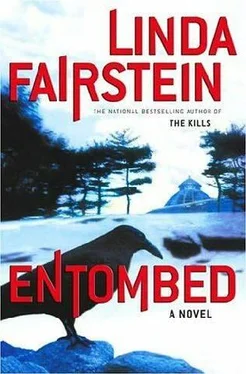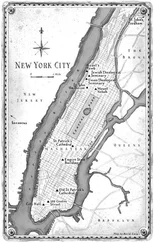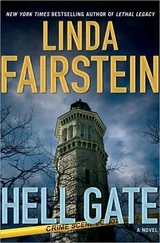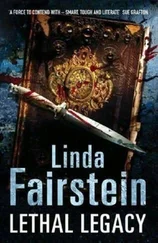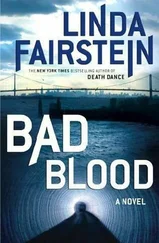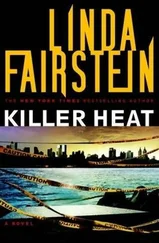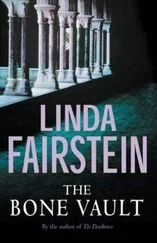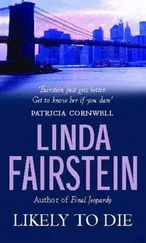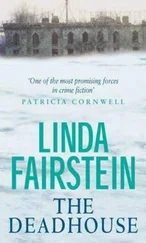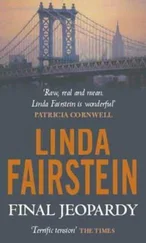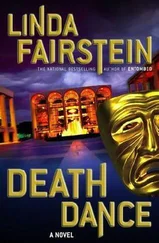Linda Fairstein - Entombed
Здесь есть возможность читать онлайн «Linda Fairstein - Entombed» весь текст электронной книги совершенно бесплатно (целиком полную версию без сокращений). В некоторых случаях можно слушать аудио, скачать через торрент в формате fb2 и присутствует краткое содержание. Жанр: Триллер, на английском языке. Описание произведения, (предисловие) а так же отзывы посетителей доступны на портале библиотеки ЛибКат.
- Название:Entombed
- Автор:
- Жанр:
- Год:неизвестен
- ISBN:нет данных
- Рейтинг книги:4 / 5. Голосов: 1
-
Избранное:Добавить в избранное
- Отзывы:
-
Ваша оценка:
- 80
- 1
- 2
- 3
- 4
- 5
Entombed: краткое содержание, описание и аннотация
Предлагаем к чтению аннотацию, описание, краткое содержание или предисловие (зависит от того, что написал сам автор книги «Entombed»). Если вы не нашли необходимую информацию о книге — напишите в комментариях, мы постараемся отыскать её.
Entombed — читать онлайн бесплатно полную книгу (весь текст) целиком
Ниже представлен текст книги, разбитый по страницам. Система сохранения места последней прочитанной страницы, позволяет с удобством читать онлайн бесплатно книгу «Entombed», без необходимости каждый раз заново искать на чём Вы остановились. Поставьте закладку, и сможете в любой момент перейти на страницу, на которой закончили чтение.
Интервал:
Закладка:
Not bad digs for a "lowly librarian," as Zeldin described himself, is what I was thinking. Perhaps he sensed that and decided to explain.
"My mother had owned that apartment, Ms. Cooper. I inherited it upon her death. She had been collecting rare books most of her life, including Poe. It's thanks to her family fortune-sewing thread, simple cotton sewing thread that my great-grandfather manufactured-that I've been able to indulge myself in my two passions, horticulture and literature."
"So you and Tormey struck up a friendship?" Mike asked.
"He was an interesting fellow. I wouldn't say we became close, but he'd call when he needed something and if it was a volume I owned, I was happy to loan it to him."
"Did the two of you talk? Socially, I mean."
"Our conversation was always about the nineteenth century, Detective. Not women, not current events, not our personal lives, if that's what you mean."
"And the Raven Society?"
"I suppose that came up. In fact I'm sure it did. Tormey eventually got around to asking me about joining, I'm quite sure of it."
"Were you already a member?" Mike asked.
"Yes, I was admitted rather early. I had come along at the moment the group was trying to expand a bit, and my scholarship in the field was well documented. I think I was in my mid-twenties when I was accepted."
"Secret handshake? Flap your elbows like a bird? Swear you'll never watch The Maltese Falcon or read Rex Stout again?"
Zeldin wasn't amused. "I submitted some of the papers I had written and demonstrated, at meetings with some of the members, that I was intimate with the body of work. I'm sure my collection of first editions made me an attractive candidate."
"So what happened to Noah Tormey? Why'd he get black-balled?"
"There was no question that he knew Poe's writings as well as most of us. But then he published a paper in one of the literary reviews. It was brilliantly researched and quite well written," Zeldin said.
I thought immediately of Emily Upshaw, who had done some of Tormey's writing for him.
"The problem was," he went on, "the piece dredged up all the petty old claims, with impressive documentation."
"The personal foibles you just described to us?" I asked, wondering why they would matter to scholars.
"No, no, Miss Cooper. Poe's plagiarism."
"His what?" Mike asked. "What did he plagiarize?"
Zeldin sighed. Then he called out the groundskeeper's name. "Phelps?"
Sinclair Phelps came back into the little office from the other room. "Yes?"
"Against that wall, third drawer down, would you mind fetching me a folder labeled 'Tormey'?"
Phelps retrieved the document and left the room. "We're talking about a young man hoping to establish himself in academia," Zeldin said, opening the file and passing an issue of the review to Mike. "Naturally, the immature Poe he wrote about was struggling to find his voice. You'll see some examples in this study."
We took a few minutes and read the first several pages. There were lines that appeared to be lightly lifted from obscure poets I'd never read. Here was Poe's "Song":
I saw thee on the bridal day-
When a burning blush came o'er thee…
And below it a poem by John Lofland, published a year earlier:
I saw her on the bridal day
In blushing beauty blest…
I had just heard Tormey yesterday, teaching his class Biographia Literaria . Now here in the paper Zeldin gave me to look at, he was quoting Coleridge and his classic description of poetry as a kind of composition "which is opposed to works of science, by proposing for its immediate object pleasure, not truth."
Next to Coleridge he interposed the words of Poe, who wrote that "a poem, in my opinion, is opposed to a work of science by having, for its immediate object, pleasure, not truth."
Least welcome to Zeldin and his cohorts must have been the lines referred to in the masterwork, "The Raven." Here was Elizabeth Barrett Browning first, hardly an obscure poet if one was to be borrowing phrases: "With a murmurous stir uncertain in the air the purple curtain…" And then Poe's famous line: "And the silken, sad, uncertain rustling of each purple curtain…"
I handed Tormey's essay back to Zeldin.
"Mr. Tormey took Poe apart, as the two of you can see. Most of my colleagues didn't treat that lightly. He was even anxious to show off his own skill at researching, noting how Edgar had taken commentary for many of his treatises practically verbatim from secondary sources, sometimes right out of the encyclopedia-like a schoolchild might do."
"Had Poe ever been exposed to this kind of claim in his lifetime?" I asked.
"Attacked for his lack of literary morals? Indeed he was," Zeldin said. "It was another source of his great despair. When Poe's critics accused him of plagiarism, he was barred from some of New York's most important literary salons."
"No wonder his characters so often resort to revenge in his stories," I said. "Poor Mr. Poe must have dreamed about it often."
"You've got that right. Of course, he took it out on other writers, Miss Cooper. He viewed everything as a personal wound. Have you ever read his volumes of literary criticism?"
"No, I haven't."
"He published quite a lot of it, and went after many of his contemporaries-quite mercilessly."
"Which ones?" I asked.
"He had absolute contempt for Longfellow. Hated him as much for the heiress he married and all the private volumes of work that her wealth enabled him to get published as for his derivative and mediocre poetry. Then there was William Cullen Bryant and Washington Irving. I could go on and on."
I thought of the Hall of Fame. Poe might have used the surrounding busts as a shooting gallery himself-taking potshots at his rivals-had it existed in his day.
"So what's the big deal to the Raven Society?" Mike asked. "People had heard this criticism before."
"Our members come to praise Caesar, not to bury him, if you will. We gather to celebrate the genius and originality of Poe, which is far outweighed by a few youthful indiscretions. We're very collegial and quite admiring of the master. We didn't need Mr. Tormey to put a spotlight on these things again. I don't know that anyone was ready to kill the young professor for that sort-"
Zeldin stopped himself with that thought. "Sorry, I shouldn't use language like that around the three of you. You might take me seriously. They just didn't want Tormey in their mix. He knew the poetry, but he didn't love the poet quite as unequivocally as the rest of us do."
"Talk about holding a grudge," Mike said. "You guys are tough. You hear anything lately from Mr. Tormey?"
The morning papers had lowballed yesterday's shooting at the Hall of Fame. It took place in the Bronx, after all, and to crime reporters, that might as well have been Siberia. An outer-borough triple homicide might earn a paragraph in the Times and space within the first ten pages of the tabloids. But there was no reason Zeldin would have heard about this assault.
"Nothing. Nothing at all."
"So the people on this last page-the ones you've blackballed- are they all here for reasons like this?" Mercer asked.
"More or less, Detective. Some aren't really committed to serious scholarship, some can't afford the dues. Why? What did you think?"
Mercer hesitated.
"Ah, were they dangerous? Is that what you mean? You're thinking that whoever killed the woman in Greenwich Village might be one of us?" Zeldin said. "Not very likely. The closest we've ever come to an actual crime was-Phelps, are you there? When was that shooting?"
The groundskeeper reappeared and leaned on the doorframe. "Outside the main gate? It must be almost ten years now."
"What did it have to do with the society?" Mike asked.
Читать дальшеИнтервал:
Закладка:
Похожие книги на «Entombed»
Представляем Вашему вниманию похожие книги на «Entombed» списком для выбора. Мы отобрали схожую по названию и смыслу литературу в надежде предоставить читателям больше вариантов отыскать новые, интересные, ещё непрочитанные произведения.
Обсуждение, отзывы о книге «Entombed» и просто собственные мнения читателей. Оставьте ваши комментарии, напишите, что Вы думаете о произведении, его смысле или главных героях. Укажите что конкретно понравилось, а что нет, и почему Вы так считаете.
